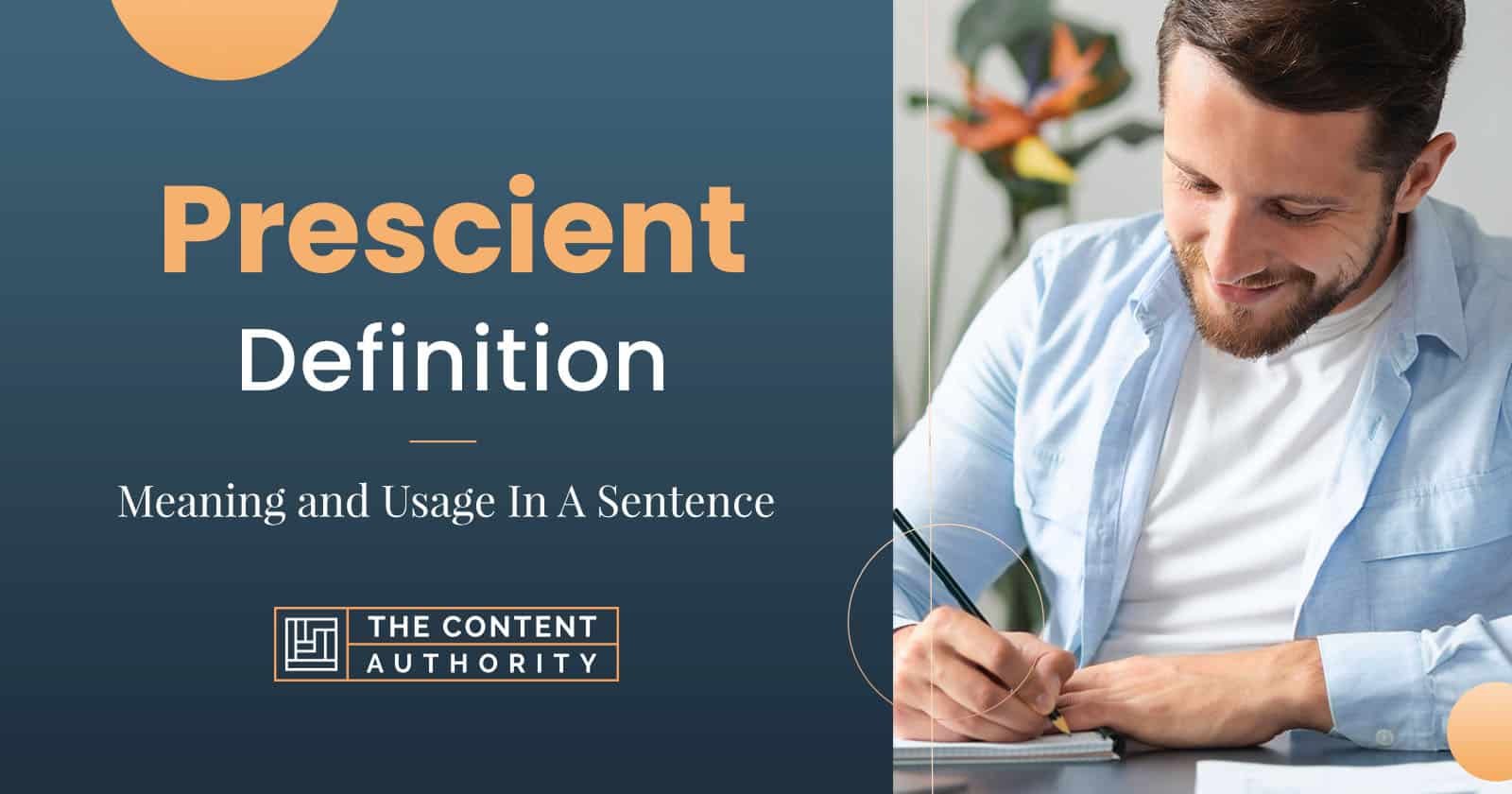Using words in sentences correctly is important when writing or having conversations because it helps us articulate our thoughts or feelings clearly and effortlessly. For instance, understanding how to use a word such as prescient will significantly improve your grammar whether you are an English speaker or writer. But are you aware of the prescient definition and meaning?
“Prescient” refers to perceiving important events before they happen. In layman’s terms, “prescient” means to know something before it happens or intuition. The words reasonable, foresighted, wise, visionary, or cautious are synonyms suitable to replace the word prescience when used in various sentences.
The word may be new to you, or you may be familiar with it already. Whichever side you’re on, you may want to keep reading this article to know all there is regarding the word “prescient” and how to use it correctly. Are you ready? Let’s begin.

What Is the Definition of Prescient?
The common definition of “prescient” is “the state of knowing what will happen before it does.” The word is used to describe people who may know about certain events in the future.
It may not be known how people receive such information and are sometimes perceived as supernatural. If you know a person who knows something before it happens without any logical information, such people are also proactive. A great example of such a person is a fortune teller.
Here are some example sentences:
- Her prescient knowledge of certain events, including the 9/11 terror attack, has made people fear her.
- The fortune-teller had prescient knowledge of how Sandra would die, what would kill her, and where and when it would take place.
What Is the Meaning of Prescience?
The word prescient refers to crucial information regarding a certain event before it happens. In this case, the word describes someone who has valuable information involving the events scheduled to take place.
Unlike the previous definition, where there is no explanation of how they get information, the people here do research to find out what will happen. For instance, a sports tipster will go through data on different teams to know the teams that will win a game.
Here are some example sentences:
- The researchers presented their prescient report on climate change and its effects on vegetation.
- Many people claim to be credible football tipsters, but none surpass the prescient tips from Matt Hardy.
Another definition of prescient is “of relation to or possessing prescience.” When someone can know what will take place before it does because they have a relation with that event, they can be described as a prescient person.
Here are some example sentences:
- Some people say my friend Olive is a lucky lady, but I know she is a prescient person.
- Erica Badu has a prescient and intoxicating personality that makes people attracted to her.
What Is The Difference Between Prescient And Precedence?
Prescience is the knowledge of an event or an action before it happens, whereas precedence is the state of preceding authority, the importance of time.
The words prescience and precedence have almost similar spelling but have different meanings. While prescience often refers to a person knowing something before it takes place, precedence refers to a status created in order of significance or rank. Thus, when using these two words, always mind their spelling as these words are different.
How to Use Prescient in a Sentence
There are other forms of the word prescient besides its adjective form; as a noun (prescience) and an adverb (presciently).
When used as a noun, the word prescience refers to the state of having the foresight of specific events before they happen. Here are some examples in a sentence:
- The audio recorded in the 1960s is worth listening to due to its prescience in anticipating the different technologies found in the future.
- If only people had listened to the homeless man whose prescience in foretelling the current events was spot on, this crisis could have been averted.
The word is also used as an adverb “presciently” to describe how a certain action is carried out in a prescient manner. Here are some examples in a sentence:
- You must understand that this precedence will presciently judge the future execution of any plans.
- The mother presciently hid her children in the attic as if she knew the rebel soldiers would come barging in and shoot the beds.
10 Examples of Prescient in a Sentence
The following ten sentences are meant to show you how you can use the word prescient in sentences. Ensure you practice using the word in different scenarios to learn and gain confidence. These sentences use the word as a noun, adverb, and adjective.
- Many people fear this man because many of his prescient prophecies have come to pass with extreme precision.
- Despite Aisha’s limited knowledge of the English language, she made her stand with sheer prescience and bravery.
- Jerry’s work is excellent, contemporary, and prescient, contrasting with Boyle, whose work is erratic, inconsistent, and shallow.
- Many will remember the president’s prescient dream of a country with better infrastructure security and equal opportunities for all.
- J.P Morgan’s actions when he was alive have made many people question whether the man had prescient knowledge on economic matters.
- Manchester City coach had prescient knowledge of the future as he predicted that they would win the trophy this season.
- I wish I had prescient information on future stock prices because such knowledge would make me rich.
- This book is worth reading because the writer had a prescient view of today’s internet.
- Mary never knew that she had been gifted with prescient knowledge of events that had yet to occur.
- Those two ideas that the board had strongly recommended could have been avoided had they heeded the presciently criticized words from the accountant.
How Do You Spell Prescient?
The word prescient is spelled as / p.r.e.s.c.i.e.n.t./
It’s also spelled as \ ˈpre-sh(ē-)ən(t)s \ in the modern International Phonetic Alphabet. The word is an easy word to spell since all the letters of the word are pronounced.
How Do You Pronounce Prescient?
The word prescient is pronounced as /preh.shee.unt/.
This American pronunciation is different from the British accent /preh.see.that./ In the American version, the middle syllable is heavily stressed, whereas the last syllable is stressed in the British version. Whichever pronunciation you choose, make sure that you are familiar with the stress syllables.
Prescient Synonym
- Judicious
- foresighted
- visionary
- perceptive
Prescient Antonym
- Improvident
- Careless
- Incautious
- Half-baked
How Many Syllables Are In Prescient?
The word prescient is a nine-letter word that has three syllables; pre-sci-ent.
Remember to mouth the syllables to know how many they are in a word.
History & Etymology of Prescient
The term prescient comes from the Latin word prescient, or it’s nominative form praesciens or pressure, its present participle.
The word prescient has its prefix pre, a Latin word meaning before. The word also traces its roots from the French word prescient, used in the 15th century, meaning foreknowing or gaining information of actions before they take place. This meaning is still used today with the current meaning.
When Was Prescient First Used?
The first recorded use of the word prescient in the English language was in the 14th century. The meaning that the parent words had are still in use today.
Conclusion
Using words such as prescient correctly will show your readers or listeners that you are conversant with English. However, you must be familiar with the word’s many definitions and uses for this to happen. You can always refer to this article if you have any challenges using this word in your speech or writing.
Shawn Manaher is the founder and CEO of The Content Authority. He’s one part content manager, one part writing ninja organizer, and two parts leader of top content creators. You don’t even want to know what he calls pancakes.


